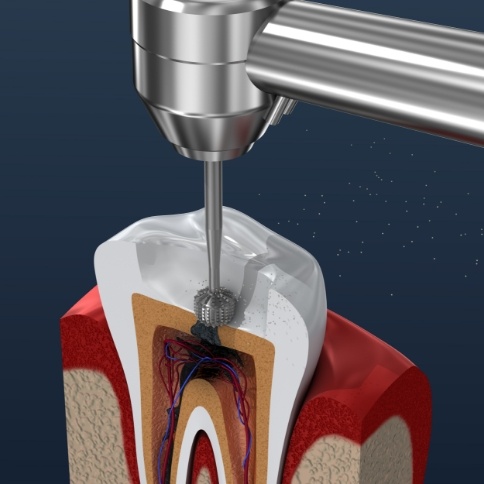Root Canal Treatment – Arlington, TX
Curing Toothaches & Saving Natural Teeth
Root canals are highly misunderstood dental procedures, which is why many dentistry patients avoid their emergency dentist at all costs whenever they have a toothache. Despite being rumored to be painful, root canals actually erase severe toothaches as a result of infection, allowing Dr. Atluri to ease your discomfort as well as preserve your natural tooth. If you’re experiencing out-of-the-ordinary oral pain, please don’t wait to call our dental office to schedule an emergency appointment to receive pain-relieving root canal treatment in Arlington, TX.
Why Choose We Smile Dental of Arlington for Root Canal Treatment?
- Dentist Well-Versed in Root Canals & Extractions
- We Accept & Maximize Dental Insurance
- Happy to Treat Patients of All Ages
Do I Need Root Canal Therapy?

Patients often assume a severe, sharp pain stemming from one of their teeth is the only symptom of a severely decayed or damaged tooth. However, there are other signs you should keep an eye out for, including:
- Severe, consistent sensitivity to hot and cold foods or beverages
- A sharp pain when biting down
- Dark discoloration on the problematic tooth
- Swollen, red, or inflamed gums
- A pimple-like bump on your gums near the tooth
If any of these symptoms arise, then you should reach out to our team right away. We also recommend visiting us on a biannual basis so that we can intervene at the earliest possible stage.
The Root Canal Process

Root canals are typically two-step processes that take place over the course of multiple appointments. Dr. Atluri’s first goal is to get you out of pain, so she’ll access the inner chamber of the infected tooth and remove the pulp before sanitizing it and clearing out all bacteria. Then, she’ll restore the structure of the tooth with a substance called gutta percha that she’ll pack in the treated inner chamber. Following your root canal procedure, she may also recommend supporting and protecting your treated tooth with a customized dental crown.
The Benefits of Getting a Root Canal

It’s not very often that the benefits of root canal therapy are highlighted. However, there are several! Here are a few:
- Root canal therapy can save your natural tooth – Instead of having your tooth extracted and replaced with a dental implant, root canal therapy means we can remove the diseased tissue and save your tooth!
- Root canal therapy is extremely successful – Many patients who receive root canal therapy have their natural tooth for the rest of their lives! Plus, the restoration protecting it can last for well over a decade with proper care.
- • Root canal therapy restores the look and function of your smile – Since restorations today come in a wide range of lifelike shades, both the look and function of your smile will be restored with root canal therapy.
Understanding the Cost of Root Canals

No one looks forward to getting a root canal, but sometimes one is necessary to save teeth from being extracted. A concern that many patients have is related to the cost of this treatment. We won’t be able to confirm the cost of your root canal until we see you in person. Until then, here are some things to think about.
Factors That Can Affect Root Canal Cost

It is difficult to determine the exact cost of a root canal until we can closely examine the area. Here are the different factors that will determine the cost of your treatment:
- Location: Depending on where the tooth is located in your mouth, the cost will vary. This is because molars have more roots than front teeth, so they tend to cost more.
- Difficulty: The more complex a procedure is, the higher the cost will be.
- Additional Treatments: If you are in need of another service, like a dental crown, in addition to your root canal treatment, you should consider this cost as well.
Is It Cheaper to Pull My Tooth?

Many patients are tempted to skip the entire root canal process and just have their tooth extracted. While the cost of a tooth extraction is typically less upfront, it’s important that you consider the long-term consequences of losing one of your natural teeth. Your bite can become negatively impacted as the remaining teeth begin to shift out of place, resulting in difficulty chewing and general discomfort. To prevent this, you would need to replace your missing tooth with a dental bridge or implant. The cost of these tooth replacement options can add up quickly. In the end, a root canal is likely the most cost-effective way to address an infected tooth – and you shouldn’t put it off! The longer you wait to get a root canal, the more likely it will need to be extracted.
Does Dental Insurance Cover Root Canal Treatment?

Root canal treatment is considered to be a “major procedure” by most dental insurance providers, so benefits usually cover approximately 50% after your deductible has been met. However, every plan is different, so it is always best to confirm this with your provider ahead of time. You don’t want to encounter any unnecessary surprises.
Other Options for Making Root Canal Treatment Affordable

If you don’t currently have dental insurance, this doesn’t mean that you are completely out of luck. With our In-House Membership Plan, patients can save on services completed at our practice. We also accept payments through CareCredit and Sunbit. These are third-party financing companies that can split the cost of your treatment into manageable monthly installments with little to no interest. To learn more about your financial options, don’t hesitate to contact us.
Root Canal FAQs
Do I Still Need a Root Canal if My Toothache Went Away?
Many patients assume that they no longer need a root canal if their toothache went away. However, if you were once experiencing dull, consistent discomfort or sharp, stabbing pain, but you now don’t feel anything, it could be because the infection has “killed” the nerve of your tooth. Although you may feel relieved that the soreness has gone away, this is not good news; now your surrounding teeth and gums are vulnerable to harm too. So, don’t put off scheduling your root canal any longer!
Are Root Canals Painful?
This is perhaps the most asked question about root canal treatment, and the answer is “no.” In fact, this tooth-saving service is designed to alleviate pain stemming from a severely decayed or infected tooth! So, if you’ve been putting off scheduling an appointment because you’re worried that it will hurt, you have nothing to fear.
Can Root Canals Be Prevented?
Yes, root canals can often be avoided! If you want to keep your teeth and gums healthy, then the best thing to do is go back to the basics. In addition to implementing a solid at-home oral hygiene regimen, prioritize scheduling an appointment with us every six months for a checkup and cleaning. From there, work on breaking bad habits (like smoking) and forming good ones (like wearing a mouthguard during sports).
Do I Need Antibiotics Before or After My Root Canal?
That depends. If you have a health condition that puts you at risk of developing an infection following a major dental procedure, then prescribed antibiotics may be necessary.
Note: You cannot take antibiotics in lieu of getting a root canal. Although this medication can kill infections in other parts of your body, it cannot kill infections in your tooth.
What Happens if You Wait Too Long for a Root Canal?
We mentioned above that the infection can progress to the point where it “kills” the nerve of your tooth. However, that’s just one of many negative consequences of waiting too long to get a root canal. There will likely become a point where this procedure is no longer an option, and we have to completely remove your tooth in order to restore your healthy smile. Plus, the longer you wait, the longer the infection has to spread to your surrounding teeth as well as throughout your body.
How Much Pain is Normal After a Root Canal?
Some slight discomfort and soreness are to be expected following your appointment. To keep you comfortable, we will provide you with aftercare instructions, including taking OTC pain medication as directed and sticking to soft foods.
